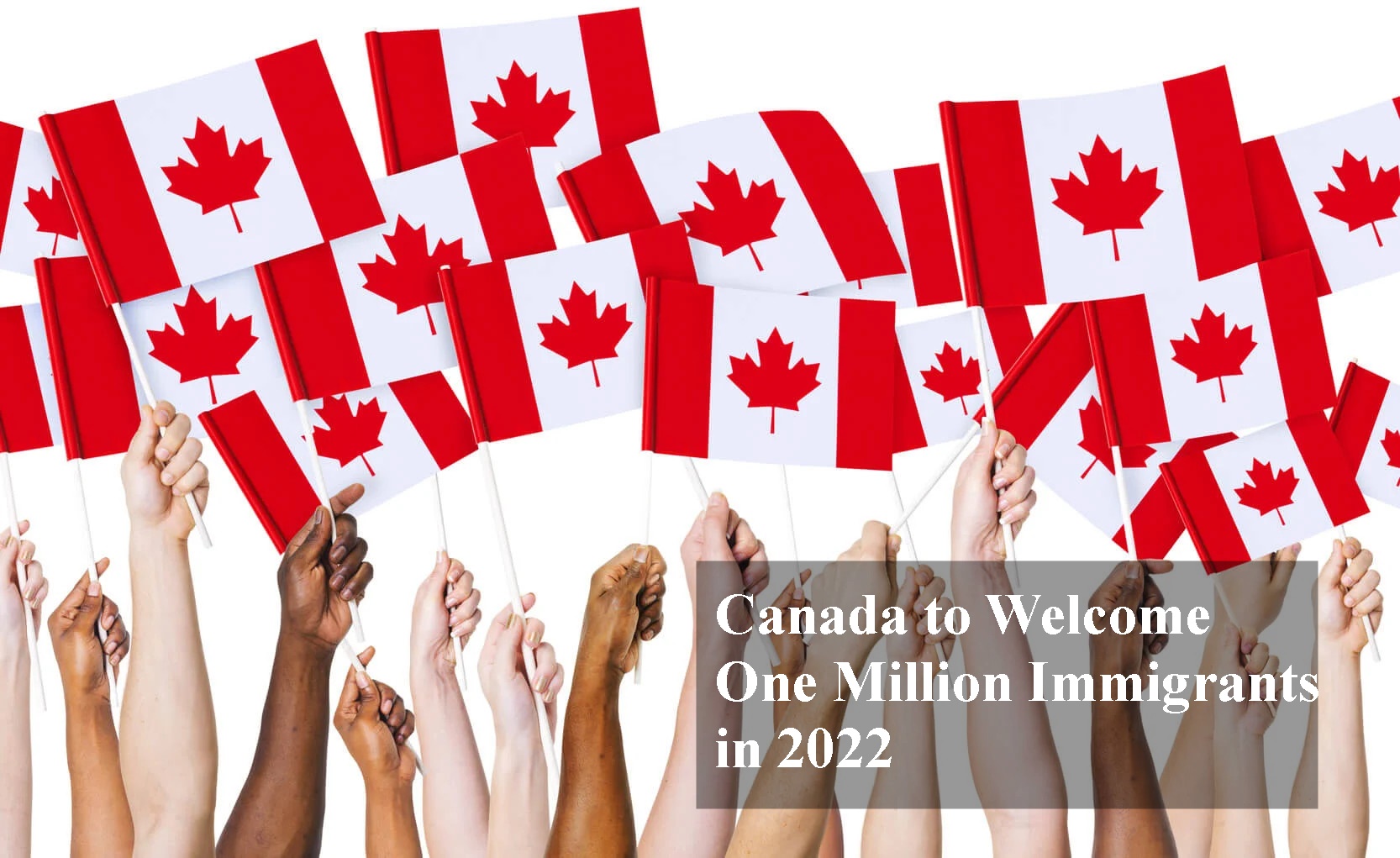Canada to welcome one million immigrants by 2023: Do you want to immigrate to Canada? Great! Over time, we’ve talked about Canadian immigration and even talked about a few reasons why you may want to consider moving to Canada.

However, now could be a good time or opportunity for you, if you plan on immigrating to Canada. You may be wondering what we mean by Canada welcoming one million immigrants by 2023? Well, it’s pretty straightforward, I believe. This simply means that Canada is opening its doors to more immigrants. Hence, if this is something you are interested in, you should begin working on it now.
Canada’s Minister of immigration, refugees, and citizenship (IRCC), Ahmed Hussein, in a statement, said “Thanks in a great part to the newcomers we have welcomed throughout our history, Canada has developed into the strong and vibrant country we all enjoy.”
Moreover, according to the Government of Canada’s 2021-2023 Immigration Levels Plan. Which was released by the Immigration, Refugees and Citizenship Canada (IRCC), following the tabling of the 2020 Annual Report to Parliament on Immigration. In the plan, Canada aims to welcome 401,000 new permanent residents in 2021, 411,000 in 2022, and 421,000 in 2023.
Immigration to Canada
Immigration to Canada is the process by which people who foreign nationals migrate to Canada to reside there, while most of them move on to become Canadian citizens. Moreover, Canada has the eighth largest immigration population in the world. As of 2019, one-fifth of the country’s population was made up of foreign citizens.
Furthermore, according to the Government of Canada’s Immigration Levels Plan for 2021-2023, you will see our title Canada to welcome one million immigrants is not made up. Canada will even welcome more than one million new immigrants from 2021 to 2023, with the initial number of the Immigration Levels Plan for each year.
However, according to the Canadian legal law, permanent immigrants are categorized by the Immigration, Refugees and Citizenship Canada (IRCC) as either of the following class:
- Family: These are persons that are closely related to one or more Canadian residents who live in Canada.
- Economic: Includes skilled workers, caregivers, or business persons.
- Protected persons or Refugees: This class consists of persons who are escaping persecution, torture, and/or cruel and unusual punishment.
- Humanitarian or other: These are persons accepted as immigrants for humanitarian or compassionate reasons.
Each of the immigrant classes makes up the total number of the Immigration Levels Plan for each year. For instance, in 2010, approximately 280,000 immigrants (both permanent and temporary) were accepted into Canada. Which 186,913 (67%) were Economic immigrants; 60,220 (22%) were Family class; 24,696 (9%) were Refugees; and 8,845 (2%) were others through working holidays, internships, and studies.
Family Class:
Canadian citizens and permanent residents may sponsor their family members to immigrate to Canada and become permanent residents in the country. But under the requirement that the sponsor (either citizen or permanent resident) accepts financial responsibility for the individual for a given period.
Economic Immigration Class:
Economic immigrants make up the larger portion of the immigration rate, therefore this class is the largest source of permanent resident admissions in Canada. IRCC uses seven sub-categories of economic immigrants, including skilled workers, which are as follows:
- Quebec skilled worker;
- Federal skilled trades;
- Federal skilled worker;
- Provincial nominee class; and
- Canadian experience class: the process is done by submitting an online profile to the Express Entry pool, under one of three federal Canada immigration programs or a provincial immigration program. The highest-ranked candidates are then invited to apply for permanent residence.
However, immigration programs for businesses that offer permanent admission to Canada include:
- Quebec Immigrant Investor Program (QIIP)
- Quebec Entrepreneur Program
- Federal Start-Up Visa program
- Quebec Self Employed
Protected Persons and Refugees:
Every year, the IRCC eases the admission of a certain number of permanent residents under the refugee resettlement category. The Canadian nationality law permits an immigrant to apply for citizenship after living in the country for 3 years in any five-year period provided that they have lived in Canada as a permanent resident for at least two of those years.
However, a candidate seeking asylum in Canada must first meet the eligibility criteria of the Immigration and Refugee Board of Canada (IRB) under two separate categories:
- Convention Refugees: Someone who is outside and unable to return to their home country due to a fear of persecution based on several factors including race, religion, and political opinion.
- Protected Persons: Claims for asylum under this category are usually made at a point of entry into Canada. Those claiming to be a person in need of protection must be unable to return to their home country safely because they would be subjected to a danger of torture, the risk to their life, or the risk of cruel and unusual treatment.
Humanitarian or Other:
Moreover, Canada also grants permanent residency on a humanitarian and compassionate basis on certain public policy considerations under exceptional circumstances. Canada is a global leader in accepting new refugees and other immigrants for humanitarian and compassionate factors. Over 4,000 permanent residents were admitted through such programs.
Canada to Welcome One Million Immigrants
In January, Canada welcomed 26,600 new permanent residents, the highest level of admissions since before the COVID-19 crisis started. The figure is more than double the 10, 795 number o immigrants welcomed the previous month which was December 2020. The rise in these figures and the recent release of the Immigration Levels Plan for 2021-2023. It is an indication that Canada to welcome one million immigrants target is a serious one. Canada will be welcoming over 400,000 immigrants in each of the next three years which will even be more than one million.
Meanwhile, with the recent economic and political issues that are ongoing across the globe. Canada has become the general destination choice for immigration which is no surprise at all. However, Canada needs immigrants as immigrants need Canada. The country is known to be built by immigrants and is still in need of more skilled workers who can help boost the country’s economy. With the idea that the country can become more stable through the contributions of others, Canada welcomes every foreign national regardless of race or religion.
Moreover, foreign nationals see Canada as an ideal immigration destination for professional growth and development. Now is the perfect opportunity if you have always planned of immigrating to Canada. Although the process for immigration may not be that easy, the requirements are based on people’s qualifications and willingness to contribute to the country’s economic growth.
How to Immigrate to Canada
I’m guessing that’s the question on your mind right now, right? Well, if you’ve been following the contents we’ve been sharing for a while now, this shouldn’t be so hard.
However, there are so many means or pathways to immigrate to Canada and become a Canadian permanent resident. There are more than 80 pathways open for foreigners seeking to immigrate to Canada. You just have to meet the requirements and qualifications needed to be eligible to apply for each program. We have already given an overview of some of these articles, you can click on the links to the specific programs to learn more about them. Some of them are as follows:
- Economic: Skilled workers, caregivers, or business persons. IRCC uses other sub-categories of economic immigrants, some of them include:
- Express Entry
- Provincial nominees
- Quebec-selected skilled workers
- Start-up Visa: for starting a business and creating jobs
- Other federal classes of immigration such as the Atlantic Immigration Pilot, Caregivers, Self-employed, Agri-food Pilot, Rural and Northern Immigration Pilot.
- Family Sponsorship: persons closely related to one or more Canadian residents who live in Canada.
- Humanitarian and Refugee Immigration
Furthermore, Express Entry is the faster and most common pathway for foreign nationals seeking to immigrate to Canada.
What Is Express Entry?
For those who don’t know, express entry is not an immigration program itself, it is an online system that the Canadian government uses to manage applications for permanent residence from skilled workers. Hence, if you are a skilled immigrant looking to settle and become a permanent resident of Canada, you should apply for express entry.
How Express Entry Works
However, you must submit your online application for permanent residence within 60 days after receiving an invitation to apply for Express Entry. Here’s a step-by-step guideline on how the Express Entry works.
1. Eligibility:
Firstly, you will have to find out if you are eligible for the Express Entry. However, there are two ways to find out if you are eligible for a program that is part of Express Entry:
- Answer a few questions to see if you meet the minimum requirements
- Read the detailed requirements for each program
Eligible applicants for Express Entry include candidates with university or college degrees with skilled work experience and moderate proficiency in English and/or French are ideal candidates. Click the link at the end of this article to view full eligibility requirements.
2. Documents:
If you meet the eligibility requirements then you should start preparing for the application process. You should begin with getting your documents ready, as some documents take a long time to get. You need certain documents at different stages of the Express Entry application process. Such as language test results to prove your eligibility for Express Entry. Click here to view the documents you will need at different stages of the application process.
3. Submit Your Profile:
Your Express Entry profile is where you provide information about yourself. These are some of the documents that you will need to submit your profile:
- Language test results
- Educational credential assessment report
- A passport or travel document
You’ll be ranked in the Express Entry pool against other profiles using a points-based system also known as the Comprehensive Ranking System (CRS). Your score is based on the information in your profile, the highest-ranked candidates will be considered for an invitation to apply (ITA) for permanent residence.
4. Apply for Permanent Residence:
Candidates with the highest scores in the Express Entry pool will receive invitations to apply. You will have 60 days to submit your application for permanent residence once you receive the invitation. The IRCC will process your application in 6 months or less if it is complete with all the necessary supporting documents.
Once, your application has been approved you will receive a mail that contains:
- Confirmation of Permanent Residence (COPR)
- a permanent resident visa (if you’re from a country that requires a visa)
The COPR will have information about who you are, as well as your photograph. You don’t need to pay any government fee to submit your Express Entry profile. You will only need to pay the fees when you receive an invitation to apply for permanent residence.
Canada to Welcome One Million Immigrants: Final Thoughts
In conclusion, please refer to the official website of the immigration, refugees, and citizenship (IRCC) using the link below for more details on the Express Entry program. You can also check our previous article about the Canadian work visa application guidelines.



